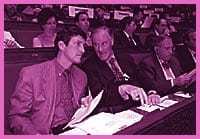“Mr Speaker, I am sure the picture of the honourable member of the NDP is posted in much more wonderful places than just police stations.” — Stephen Harper
Is this a homophobic slur or politics as usual?
Last month Alliance Party leader Stephen Harper rose in the House Of Commons and spoke against the scandals surrounding several Liberal cabinet ministers. The official House record quotes Harper as saying the ministers’ photos “are posted in every newspaper. They are posted on every bulletin board and, for all I know, in most police stations in the country.”
NDP MP Svend Robinson, the openly-gay MP for Burnaby-Douglas immediately demanded Harper withdraw the comments.
At that point Harper made his “wonderful places…” comment towards Robinson, and all hell broke loose. Robinson, speaking outside the house shortly afterwards, described the comments as “despicable” and said Harper was “wallowing in the gutter…. It sounded to me like probably a pretty thinly-veiled homophobic attack.”
So why was Robinson so incensed by Harper’s remark? Isn’t this just the kind of give and take that happens in the House Of Commons?
Dr Fred Fletcher, director of the York/Ryerson joint graduate program in communication and culture, says the House Of Commons can be a rough place.
“It’s pretty raucous there. Customarily there’s a lot of heckling.”
But how is having your picture put up in interesting places a homophobic slur? Shouldn’t Robinson just lighten up? Fletcher thinks not.
“I doubt that Harper’s remark [was intentionally homophobic], but I do think that sentiment is there in the Alliance. I think the comment was offensive. If you take the plain wording of it, the meaning is not clear, but if you put it in the context of the House [it is].”
Robinson says it was the context of the remark.
“It wasn’t just wordplay,” he says. “You had to be there. The tone was kind of a smirking tone with which he delivered it.”
Coincidentally, Robinson’s hate crimes bill was due to be reintroduced for second reading the same day as Harper’s remarks. Is it possible that Robinson picked a fight to gain publicity for the bill? Robinson says that’s out of the question.
“Nobody has said that. Nobody has even suggested that, so I certainly wouldn’t expect that suggestion to come from the gay media. I’m not even going to dignify that with an answer.”
Robinson is no stranger to publicity and has had his picture posted in many places. In June, he posed nude in a fundraising calendar for a BC environmental group.
Author Mark Milke, speaking in October on Global Television’s Last Word said, “If Svend doesn’t want cracks about where his pictures may appear, then he shouldn’t disrobe for the camera.”
Robinson says that in general, the House is not homophobic.
“That’s one reason why I think many people were concerned about Harper’s attack. It really was exceptional. We haven’t heard that kind of even veiled attack for quite some time. Overall I think there’s been a definite rejection of visible and audible homophobia in the house.”

 Why you can trust Xtra
Why you can trust Xtra


